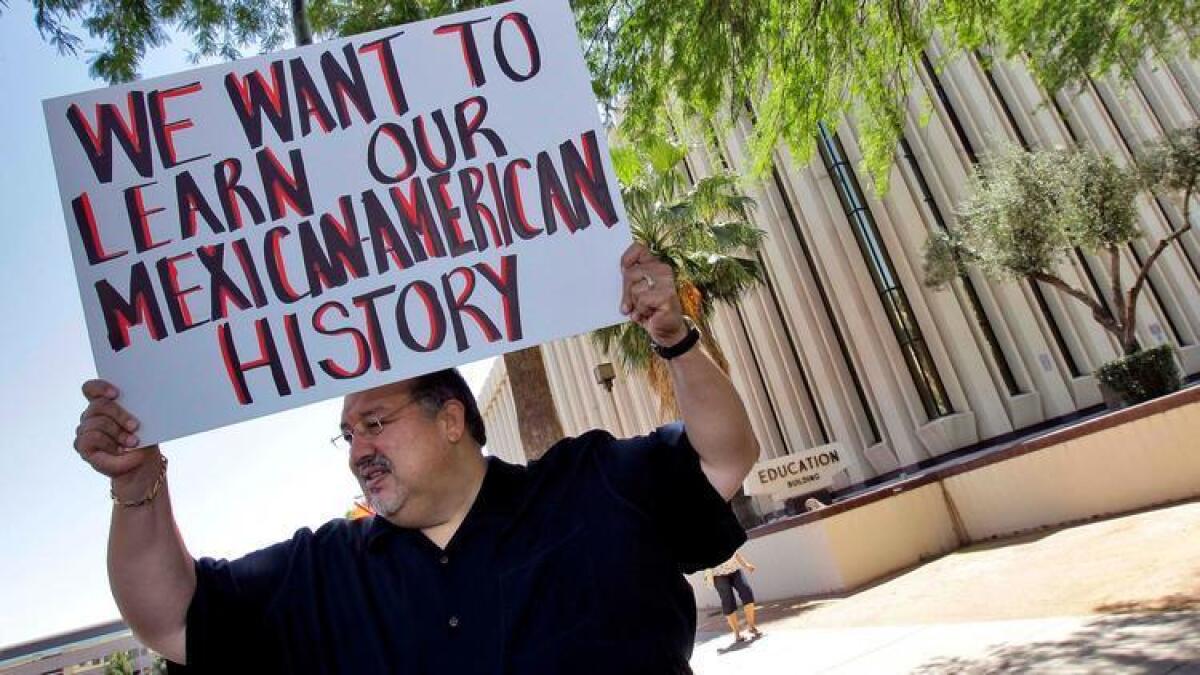Federal judge blocks Arizona from banning Mexican American studies classes

A federal judge on Wednesday blocked the state of Arizona from enforcing a controversial law banning ethnic studies courses, bringing near a close a seven-year battle over teaching about Mexican Americans in Tucson public schools.
Wallace Tashima, a federal appeals court judge sitting in the district court in Arizona, said in his injunction that state legislators who passed the ban in 2010 violated the Constitution.
The decision came in a lawsuit brought by students in 2010 against the state’s board of education. Supporters of ethnic studies said the law, which banned courses designed primarily for students of a particular ethnic group, was racist and targeted Mexican Americans.
Tashima said the ban was “not for a legitimate educational purpose, but for an invidious discriminatory racial purpose and a politically partisan purpose.”
Tashima also said the state could not keep funding from schools for not obeying the ban. The state’s threat to withhold more than $14 million led Tuscon to drop its Mexican American studies program in 2012.
The judge added that the state cannot lead “any inspections or audits of any program, curriculum or course” to check whether a school district is following the 2010 law.
A former teacher in the Tucson program, Curtis Acosta, celebrated on Twitter. “This! Happy New Year, mi gente!” he wrote.
Richard Martinez, an attorney who represented the teachers and students in the lawsuit, said “the judge gave us precisely what we asked for.”
The Tucson district has not said whether it will revive the curriculum, which helped spur similar educational programs in schools around the country. The Arizona attorney general’s office has also not said whether it will appeal the injunction.
When the law passed, activists protested it as a symbol of anti-Latino sentiment, and said state was using racism against Mexican Americans to sow political divisions. It was all the more controversial because it came to be the same year as the widely protested SB 1070 law, which required police to determine the immigration status of people arrested or detained when there was “reasonable suspicion” they were not in the U.S. legally.
The injunction follows an August ruling from Tashima in which he said said the law was unconstitutional and racially motivated. He not did not issue an injunction against it until Wednesday.
In August, Tashima said the law violated the equal protection clause of the Constitution by discriminating against Latinos and violating students’ 1st Amendment “right to receive information and ideas.”
Tashima also criticized John Huppenthal and Tom Horne, the former Arizona state superintendents of public instruction who pushed to pass the ban.
“Defendants were pursuing these discriminatory ends in order to make political gains,” the judge wrote. “Horne and Huppenthal repeatedly pointed to their efforts against the [Mexican American studies] program in their respective 2011 political campaigns, including in speeches and radio advertisements. The issue was a political boon to the candidates.”
Jaweed Kaleem is The Times’ national race and justice correspondent. Follow him on Twitter, Facebook and Instagram.
More to Read
Sign up for Essential California
The most important California stories and recommendations in your inbox every morning.
You may occasionally receive promotional content from the Los Angeles Times.











